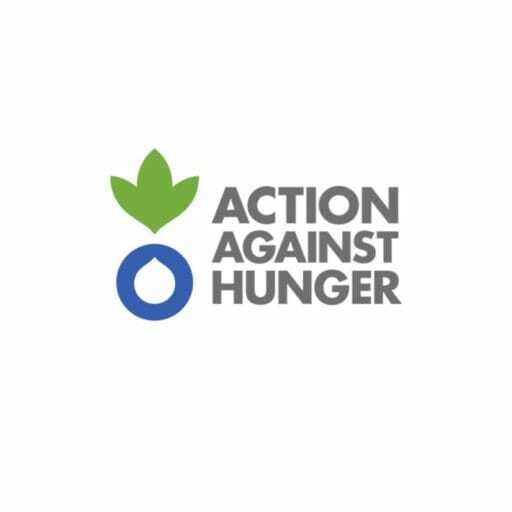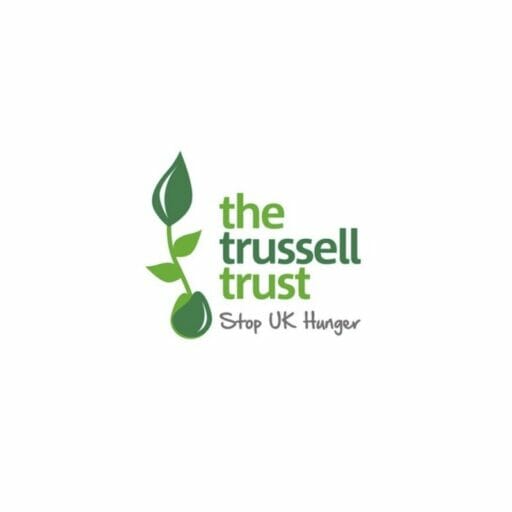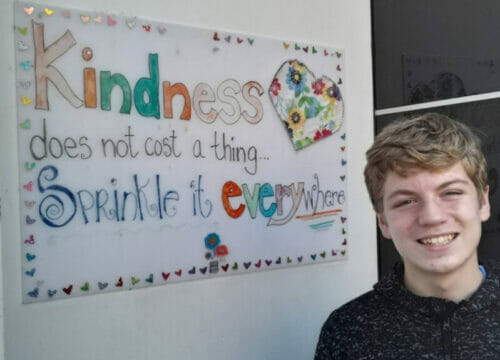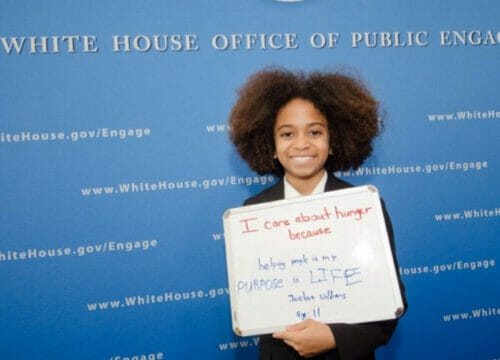We’re an international charity committed to saving the lives of malnourished children and supporting their families to beat hunger.
Zero Hunger
Nutritious food for the whole world

1. THE PROBLEM
Can you think of a time recently when you’ve been really, really hungry? How did that feel?
Lots of people in the world are hungry. This means that they often do not have access to adequate food and may go to bed feeling hungry.
There are lots of different causes of hunger like climate change, conflict and poverty.
When people don’t eat enough it can have serious effects, such as: stunted growth, a weakened immune system, impaired intellectual development and reinforced poverty.

2. The Solution
So what can we do to help?
Solving the hunger problem is difficult but people are working on different ways to improve things. One short-term solution is to send food rations and parcels to people who need them.
In the long-term things like using special climate resilient crops, supporting smaller famers and ending poverty will help beat hunger around the world.

3. Take Action
There are lots of ways that anyone, including you, can make a difference in solving the hunger problem. For example, you could: raise money for those in need of food or make a poster to raise awareness about food waste.
Everyone can take action to make real change. What will you do?



4. CHARITIES
There are lots of charities that need your help to end hunger around the world.
For example, The Trussell Trust run food banks across the UK, FareShare redistribute leftover food to those in need and Action Against Hunger provide emergency food to malnourished children.
See how you can support them in their amazing work.
When you get very hungry, you can’t wait to eat something. And if you don’t eat something you might start feeling tired and dizzy. You might not even be able to think straight and you could develop a headache and feel shaky. Hungry people often tend to get a little grumpy too!
It isn’t nice at all to feel like this. People usually don’t feel like doing anything on an empty stomach. Imagine needing to take your exams while you feel dizzy and shaky from hunger, or what it would be like to live like that every single day. What would it feel like to go to bed while you’re hungry, not knowing where your next meal is coming from?
While you’re exploring this sustainable development goal, don’t think of ‘hunger’ as feeling hungry once in a while and then eating to make the hunger go away.

The hunger discussed here is:
- not having access to food regularly
- having too little food to keep your body healthy
- not getting enough of the right food.
Hunger causes people to:
- stop growing
- lose muscle and fat
- get sick more often
- struggle to concentrate.
So just keep in mind, that when talking about world hunger, being hungry is much more than the feeling of wanting to eat pudding after dinner!
The problem
811,000,000
PEOPLE IN THE WORLD ARE HUNGRY
99,000,000
CHILDREN UNDER THE AGE OF 5 ARE UNDERWEIGHT
1/3
OF ALL FOOD PRODUCED GOES TO WASTE
1. Causes of Hunger
There are many different causes of hunger. These include:
Climate change is causing extreme weather events – such as floods and droughts – that some crops cannot withstand, meaning that the crops fail and food production is halted.
For example, in the country of Lesotho (in Africa) corn is one of the most commonly eaten foods. When a drought strikes, the water shortages lead to crop failures and Lesotho is suddenly unable to produce enough corn to meet the needs of its people. Since there is less corn available and people have to compete for what there is, the price of corn goes up and many people find themselves in a situation where they can no longer afford to buy corn. Sadly, climate change is making drought more and more common in Lesotho.
Conflict disrupts economic activities, such as trade. A country in a state of conflict may no longer be able to import goods from abroad, leading to food shortages. Conflict often forces farmers and food producers to hide to stay safe, so they can’t work and make food for everyone. Finally, conflict triggers the displacement of people, who are known as refugees. Refugees often end up living in makeshift camps with limited access to resources.
Watch the video on the right of An Ordinary Day At Zaatari Refugee Camp. This video shows the food situation in a refugee camp in Jordan. The World Food Programme has done a fantastic job here and it looks as though everyone receives some food each day. Think about the food that is on offer – how does it compare to the food that you might eat at home? Think about what it might have been like before the World Food Programme got involved.
Poverty means people do not have enough money to buy food. In some cases, this means that they cannot buy food at all, in other cases it means that they can only buy cheap food, low in nutritional value. Shockingly, the people that are most affected by poverty and hunger are the people who produce our food. More than 50% of the world’s hungry people are farmers who work on small farms.
There are two main reasons for this:
- Small scale farmers do not have the machinery and technology to compete with large-scale producers,
- Small scale farmers are paid unfairly.
Watch the video on the right about the ‘Paradox of Hunger’ (the fact that farmers are most likely to suffer from hunger).
2. Food Waste and Inequality
You’ll notice that ‘too little food in the world’ is not one of the causes of hunger. This is because there is enough food in the world to feed everyone (at the moment). Sadly, a lot of this food is wasted. Up to 1/3 of all food that is produced goes to waste – all the way from the farm, right up to the point where it goes to waste in people’s homes. This is a pity because a lot of precious water and other resources go into producing food and it’s becoming harder and harder for farmers to grow crops with the changing climate.
There are many reasons for this food waste and they are quite complicated. One big contributor to food waste is inequality. Food inequality relates to the unfair distribution of food.

On the one hand, there are lots of hungry people who cannot access food and are considered undernourished. On the other hand, some people can access food so easily that they buy too much and end up eating too much and wasting the rest. These people are considered overnourished. Eating too much is a problem in itself. People who eat too much may end up putting on weight and become overweight or obese. More than 2 billion people (1 in 4) in the world are considered overweight.
Hunger Around The World
Since climate change, conflict and poverty are present all over the world, there are hungry people in all countries. The causes of hunger are more common in countries that are still developing and so hunger is more likely to exist there. This is particularly the case in Africa, where nearly 21% of the population is considered hungry. But hunger is not just a problem in developing countries. In the UK for example, 12.5% of the population is considered hungry and 2.5 million people had to rely on food banks in 2020.
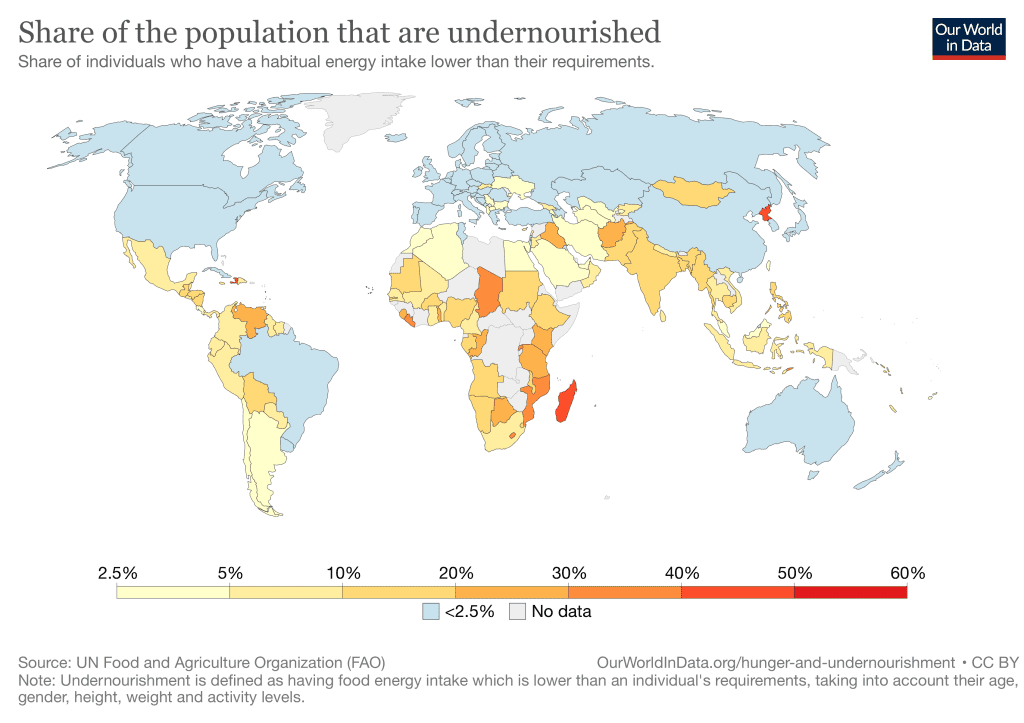
Interpreting the Map
This map shows the percentage of people in each country who are undernourished, meaning their total daily food usually contains less energy than what they need. The key at the bottom can help you interpret the map. In the countries in dark red, up to 60% of the population is undernourished. In the countries in cream, less than 2.5% of the population is undernourished.
3. Effects of Hunger
Being hungry, or not having enough nutritious food, can have serious short- and long-term effects.
This is when someone stops growing at the rate that a person of their age is expected to grow. They sometimes begin to waste, meaning that they lose an extreme amount of body fat and muscle.
This is when someone has not eaten enough nutrients so the production and activity of antibodies in their body is reduced. People with a low immune system can’t fight disease very well, so they get sick.
When someone faces severe hunger as a baby or young child, their intellectual development won’t be as good as it should be. This means that they will not be able to reach their full potential. Children and adults suffering from severe hunger also can’t focus as well and do a good job at school and work.
The effects outlined above mean that those suffering from severe hunger are often trapped in a cycle of hunger (shown below). They are more likely to be weak, get sick, have impaired intellectual development and/or can’t do as much as a well-fed person can. This makes it very difficult for them to get jobs and earn money to buy the food that they need.

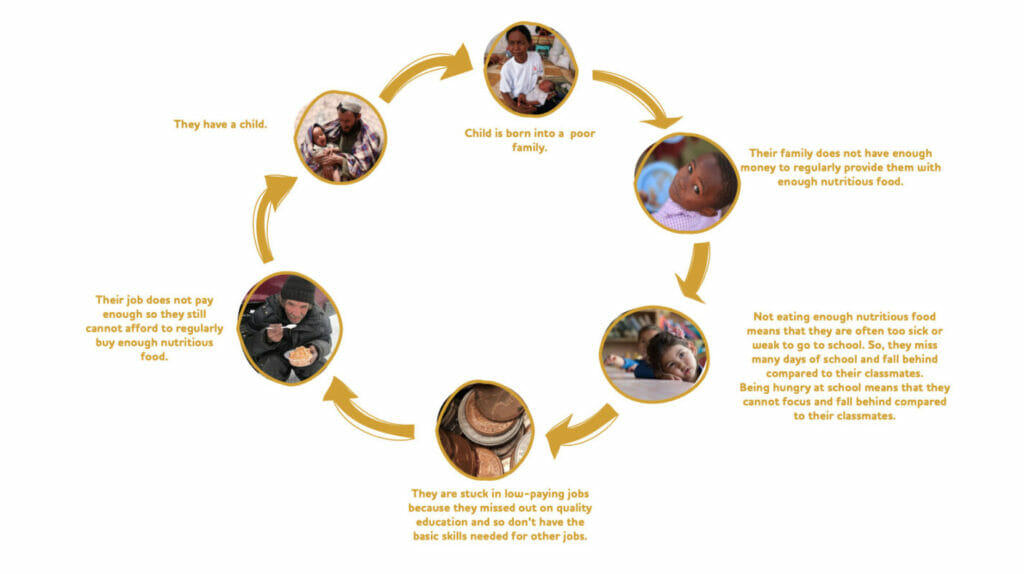
Take a Guess
The Solution
The world produces enough food to feed all 7 billion people. In fact, experts think that at the moment we are probably producing enough to feed 10 billion people.
The challenge is to make sure that food is fairly distributed so that everyone gets what they need.
1. Immediate Help
In the short term, there are lots of charities and organisations that offer temporary and emergency relief to those in crisis all over the world. They rely on donations from people like you to bring food rations and parcels to as many hungry people as they can. This could be supplying food banks that give out food to those who can’t afford the food they need in the UK or delivering food parcels to those living in a war zone. Watch the video below to see how a Food Bank works and the impact it might have on users.
In many developed countries, such as the UK, governments allocate some of the money that they raise in tax to those most in need. For example, the UK government provides free school meals to 1.7 million children living in the UK whose parents cannot afford to provide them with a nutritious meal. But providing food to all the hungry people in a country is very expensive so some people are left behind. In 2020 it was estimated that, even with the help of the government and charities, almost 2 million children in the UK missed meals because their families could not afford food.

2. Lasting Solutions
Rather than offering people help when they find themselves hungry, we are striving for a fairer world in which everyone can access adequate food themselves and food banks and emergency support systems are no longer needed. The following long-term solutions can help build a sustainable solution to hunger:
SUSTAINABLE AND CLIMATE RESILIENT AGRICULTURE
Climate change is disrupting food production, leading to shortages in certain areas. There are many ways that our agricultural processes can be adapted to make them less vulnerable to climate change. For example by:
- Promoting crops such as quinoa that can cope better in high heat. Heat-sensitive crops start failing sooner with rising temperatures due to climate change.
- Increasing water-use efficiency by using drip irrigation systems. This helps agriculture to continue in times of drought.
- Maintaining a variety of crops, also known as biodiversity, ensures that if one crop is struck by the effects of climate change or disease, there are plenty of other crops that remain unaffected.
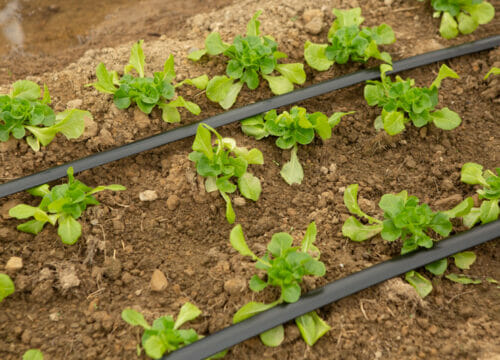
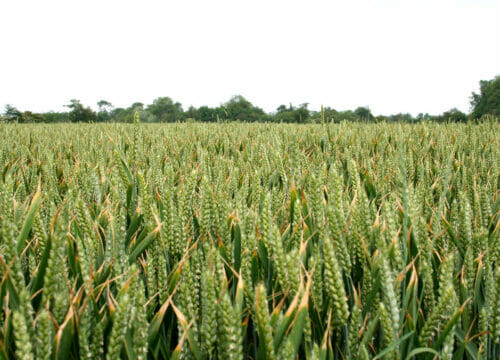
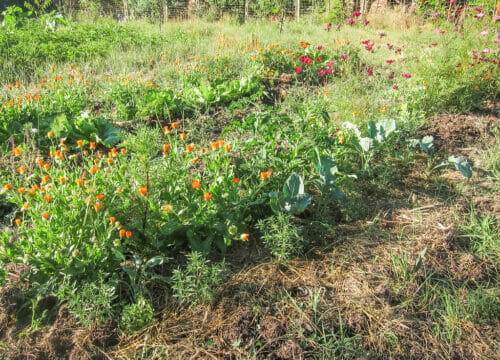
Supporting Small Scale Farmers
To make small-scale farmers less vulnerable to hunger, they need training and equipment to keep up with large-scale farmers. But a lot of the time this is very expensive and small-scale farmers cannot afford the cost of machinery all in one go. So, farmers need to borrow the money from a bank, or the person selling the machinery needs to be willing to be paid in small amounts over time. This is called credit.
They also need to be protected so that they are paid a fair price. You may have seen the Fairtrade certification badge on some of the products that you buy. In fact, 1 in 3 bunches of bananas sold in the UK is Fairtrade. For products to receive the Fairtrade certification producers need to show that their farmers are paid fairly. Watch a video on what Fairtrade is below.

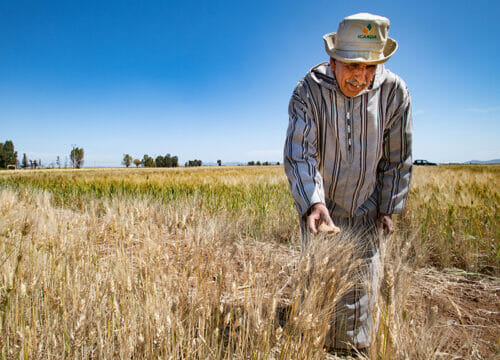
Ending Poverty Worldwide
To ensure that everyone has enough money to buy the food that they need to lead a healthy and productive life, we need to end poverty worldwide.
This is a big challenge and will require lots of changes to address the root causes of poverty. These include: Social Injustice, Education, Health, War and Conflict and Climate Change.
As a priority, we need to:
- Get countries and communities to work together. This will help maintain peace so that countries can share knowledge about how to achieve the things that everyone wants – like keeping everyone healthy.
- Raise awareness about how people are different and that everyone should be included. Everyone should have a fair shot at opportunities such as education and healthcare, and should receive fair treatment in society and work.
- Encourage governments to create countries that are equal and fair, where everyone has access to what they need. This could be done by using a certain type of tax system, where wealthy people pay more tax than poor people. They could also provide universal healthcare, which helps everyone living in a country to access healthcare, no matter how much money they have.
Take action
Now that you understand a bit more about Hunger, it’s time to make a difference. It isn’t nice to think about people having to skip meals and some people feel guilty about having food while others don’t. If this is you, be grateful for your food, and realise that because you aren’t stuck in the hunger cycle, you are in a position to help others. If you want to do something practical to help, the power is in your hands. Take a look at some ways you can take action right now.
Fundraise
- You can make a massive difference to people and the planet by doing fundraising for charities that work to make cities and communities sustainable. Some of the things the money you raise can achieve:
- £1 provides 4 meals for children in need
- £10 provides 40 meals for children in need
- £42 provides six weeks of life-saving therapeutic food for a malnourished child.

- Use up your old fruit and vegetables. Fruit and vegetables often start looking a bit sad long before they are unsafe or unpleasant to eat. Click to find some recipes of ways you can use up your old fruit and vegetables in smoothies, banana bread, or vegetable soups.
- Encourage your family to shop at TooGoodToGo. TooGoodToGo lets you buy fresh leftover food from cafes, restaurants, hotels and shops at a reduced price. The food doesn’t go to waste and lots of happy tummies enjoy a delicious restaurant-cooked meal for not a lot of money. It’s a win-win situation!
- Check for the Fairtrade certification when you are shopping and choose Fairtrade products over non-Fairtrade ones, even if they happen to cost a little bit more. Remember, the other option might be cheaper because farmers didn’t get fair payment for their food!
- Load your plate up with a small portion and come back for more if you are still hungry.
- Have you ever heard of the expression ‘Having eyes bigger than you can eat? All too often people load up their plate with lots and lots of delicious-looking food and then halfway through their meal their stomach gets full and they have to put the rest in the rubbish. It is far better to load your plate up with a small portion and come back for more if you’re still hungry. Then, if there is still food left at the end of the meal, you can put it in a container and eat it as leftovers. If you don’t fancy eating that meal again in the next few days, you can often freeze the food and it will last for many months.
- Write to your MP to ask them to help redistribute leftover food to those in need. You can sign FareShare’s letter here.
- Make a poster to raise awareness about food waste and how people can waste as little food as possible. You might like to include some shocking statistics on food waste to grab people’s attention.
- Make a poster to give people information about food banks and how to donate. For example, you could search The Trussell Trust website to find the food bank nearest your school here. You may also like to include information on what kind of donations food banks appreciate. You can find information here.
- Challenge your friends to try this 4-week food waste challenge (and join them on the challenge too!). The challenge will help you all discover why good food may be going to waste in your home so that you can change your habits and reduce food waste.
- Donate to your local food bank. If you are feeling particularly enthusiastic you could even organise to collect donations from your school, street, friends and family, and drop them off yourself at the food bank. Put posters up to let people know what you need and where to drop it off. Organising the drop off will make donating much easier for other people, meaning that they are more likely to donate. Sometimes food banks need specific items; if you are organising a big collection, you can contact your local food bank in advance to see if they have any special requests. You can find your local Trussell Trust foodbank here.
- Give your leftover food to homeless people who might not be able to buy their own. Team up with a grown-up to help you bag up leftover food and walk the streets handing it out to people in need.

If you have any other ideas of SuperKind things people can do to help eradicate hunger, we would love to hear from you here.
Support These Amazing Charities
Comic Relief
Comic Relief is a charity that helps people in need by raising money for families and children in the UK and worldwide.
World Food Programme
We bring life-saving relief in emergencies and use food assistance to build peace, stability and prosperity for people recovering from conflict, disasters and the impact of climate change.
The Trussell Trust
We support a nationwide network of food banks that provide emergency food and support to people locked in poverty, and campaign for change so that food banks are no longer ...
FareShare
FareShare is the UK’s biggest charity fighting hunger and food waste. We take good quality surplus food from across the food industry and get it to 10,500 frontline charities.
Change-Makers
Here are some amazing young people who cared about beating Hunger and took action to make change happen. These change makers were all passionate about the same cause but used their unique skills to make change happen in different ways.
Everyone can help make a difference. Consider what your unique superpower might be. Are you someone with a strong voice who likes to spread awareness by talking to everyone you meet? Or do you prefer a behind the scenes approach – making sure that donations are collected to take to those in need?






